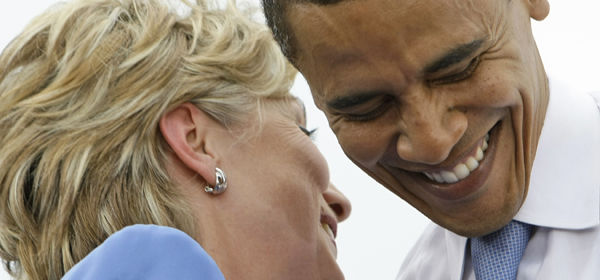
Sam Stein
Over the past few weeks, the Republican National Committee has made it a point of pride to send out memos portraying a great fissure between the respective camps of Hillary Clinton and Barack Obama.
Last Thursday, for instance, saw an email with the subject line "The Healing Process Was Far From Over." Earlier the party blasted out stories showing Clinton supporters demanding a vote at the Democratic Convention. Then, when that vote was granted on Thursday, the RNC sent out a clip from Michael Goodwin of the New York Daily News, titled "Barack Obama blinks in Hillary face-off."
It's enough to give the impression (certainly, it's designed to give the impression) that chaos is ripping apart the Democratic Party, leading waves of Clinton backers to the precipice of defecting to John McCain.
It is almost completely untrue. In actuality, as Marc Ambinder noted on Friday and as several Clinton confidantes have told the Huffington Post, the two Democrats are far closer towards political unity than imagined when their primary fight ended.
"This is all a tempest in a teapot driven by a whole lot of media sources and the RNC looking to make trouble," said Mike Berman, a longtime Democratic hand and friend of Bill and Hillary Clinton.
Moreover, Thursday's announcement that Clinton would get a roll call vote at the convention -- in the process placating her supporters and providing her with the chance to state her support for Obama -- is seen even by the most hardened Clinton fanatics as an important step towards reconciliation.
"I was on record saying I didn't think this was a good idea, because I was worried about the PUMA [Party Unity My Ass] supporters, people who are indifferent to a McCain presidency and are only driven by anger, which is not to criticize them, that is a genuine emotion," Lanny Davis, one of Clinton's more vocal supporters, told the Huffington Post. "That is reality and I thought that giving her a roll call vote would be destructive and counterproductive at the convention, because it is impossible to control the way the media would cover it. The most vocal Obama critics would be surround by 50 television cameras and be given their 50 seconds of fame."
It turned out, Davis went on, "that I had less faith than my candidate and Sen. Obama... The compromise they have just announced pulls off the exact solution that allows people to cast their votes and allows people like me to separate ourselves from the five percent of folks who weren't going to support Obama no matter what."
So how to explain the incessant speculation that the Clinton and Obama camps are irreconcilably at odds? There are a number of theories. The primary battles, which went on longer than any prior, are still fresh in people's minds. Bill Clinton's off-the-cuff failure to offer even the slightest hint of rhetorical support for Obama is giving observers a false impression. Certainly the relatively slow mutual fundraising efforts haven't helped matters. And the occasional political misstep (like, say, having a "Pray for HRC and her supporters" event posted on Obama's website by his backers) is an irritant as well.
But the most significant contributor towards the overstated perception of animosity is also the most obvious: the individuals invested in the idea that Obama and Clinton cannot overcome their differences are the ones speaking the loudest.
On Friday, a superdelegate told the Huffington Post that after the roll call vote was announced, she was sent more than 250 separate emails from PUMA representatives urging her to buck the primary results.
"The Democratic VOTERS want you to support a real winner and leader. The American PEOPLE want you to. Common Sense wants you to. A commitment to DEMOCRATIC PRINCIPLES wants you to.
PLEASE DO THE RIGHT THING. AMERICAN DEMOCRATS AND VOTERS WILL SUPPORT YOU FOR YOUR COURAGE AND WILLINGNESS TO STAND UP TO PARTY INSIDERS BY REPRESENTING THE VOICE OF THE VOTERS."
There is no similar effort, for obvious reasons, coming from Clinton supporters who are content with how the process has played out.
Then, of course, there is the Republican Party, which directly benefits from the perception of irreconcilable differences between the two camps. John McCain, for starters, has made direct overtures to Clinton backers. The RNC, meanwhile, has resorted to an email campaign that seems more designed to drive a media narrative than document actual political events.
"I don't think Hillary has pushed [the Obama camp] hard about what she wanted in particular... so I don't know what the big deal is. People are looking to make something that is not here, which is my view. And if it is the Republicans doing it that drives home the point that they are making something out of nothing," said Berman. "She will give a great speech at the convention. Her supporters will cheer for her vigorously, and then Obama will take it over and very few people will remember that there was ever talk of problems."

No comments:
Post a Comment